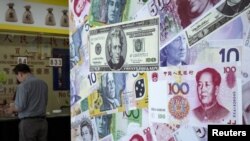Talks between the U.S. and Chinese officials next week are expected to address U.S. concerns over China’s currency devaluation, and Beijing’s desire for support on making the yuan a stronger international currency.
Democratic and Republican lawmakers in Congress have criticized China’s moves earlier this year to devalue the yuan, which has fallen about three percent. This week a group of seven lawmakers wrote a joint letter to U.S. Trade Representative Michael Froman and Treasury Secretary Jack Lew drawing concerns that the move led other countries, including Vietnam and South Korea, to devalue their currencies following China’s drop in August.
“We fear these recent currency interventions could lead to a pattern of competitive devaluation within the Asia-Pacific that could hurt U.S. workers and exports for years to come,” the lawmakers wrote.
Sinking Yuan
The yuan’s devaluation has been small so far, but finance consulting firm IDEAglobal this week projected that authorities could drop it by 15 to 20 percent by the end of 2016.
"Having achieved a three percent move in a few weeks, they would not want to stop here. Their ultimate target is probably a 15 to 20 percent minimum move in the trade-weighted index," IDEAglobal cited the source as saying in an interview.
China’s devaluation has been broadly seen as a way for the country to boost its export industries, following economic data showing a drop in output in recent months. Chinese officials have said they would not trigger a currency war, but with the country’s flagging stock market, some analysts see a devaluation as a method for boosting exports.
What China wants
Chinese officials are heading to Washington with a different set of currency concerns.
Beijing wants U.S. support to ensure that the yuan is admitted in the elite club of currencies preferred by the International Monetary Fund for its Special Drawing Rights. The “SDR” is an international reserve asset which is based on the value of four currencies: the U.S. dollar, the Japanese yen, the British pound and the euro. The IMF meets once every five years to decide whether to include a new currency in the group, and China is pushing for the yuan to be included in the next review. The IMF is expected to make a decision on whether to include the yuan later this year.
Xi, who is due to visit the U.S. from September 22, is expected to explore the possibility of Washington’s backing on its issue, analysts said.
“Without the understanding of the U.S. there will be much trouble for China’s currency plans,” Johnny Fang, an expert with consultant Z-Ben Advisors, said. “So it’s very important for two countries to be well coordinated.”
Being included in the SDR will put the yuan solidly on the road to becoming an international currency. It will also enhance its status as a reserve currency. The idea is to encourage different countries to hold their savings in yuan reserves. At present, most countries use the dollar or the Euro to hold foreign exchange reserves.
"It definitely will help the yuan be included in the IMF's Special Drawing Rights currencies because the next review of SDR will take another five years," Oliver Rui, professor of finance and accounts at the China Europe International Business School in Shanghai said. "It will also help the RMB become a foreign reserve currency".
China likely needs U.S. support in the endeavor to persuade the IMF for several reasons. It takes 70 percent support in the IMF’s executive board for a new currency to be included in the basket. Besides, the United States holds veto power, which can block any IMF decision. The U.S. dollar has the highest share of 41.9 percent in the IMF's currency basket.
Challenges for China
For now, China’s bid to win over the IMF appears challenging because of Beijing’s continuing controls over yuan trading. China recently allowed the yuan’s value to fluctuate more on the market, but strong government controls are still in place. “Of course, the IMF will evaluate the ease with which the yuan can be used as an international reserve currency as part of its consideration for including the yuan in the SDR basket,” Li Wei, professor of Economics at Chueng Kong School of Business in Beijing, said.




